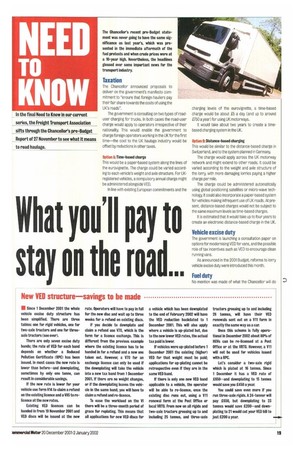In the final Need to Know in our current series,
Page 19

If you've noticed an error in this article please click here to report it so we can fix it.
the Freight Transport Association sifts through the Chancellor's pre-Budget Report of 27 November to see what it means to road haulage. Taxation
The Chancellor announced proposals to deliver on the governments manifesto commitment to "ensure that foreign hauliers pay their fair share towards the costs of using the UK's roads".
The government is consulting on two types of roaduser charging for trucks, In both cases the road-user charge would apply to operators irrespective of their nationality. This would enable the government to charge foreign operators working in the UK for the first time—the cost to the UK haulage industry would be offset by reductions in other taxes.
Option A: Time-based charge This would be a paper-based system along the lines of the eurovignette. The charge could be varied according to each vehicle's weight and axle structure. For UKregistered vehicles, a compulsory annual charge might be administered alongside VED.
In line with existing European commitments and the charging levels of the eurovignette, a time-based charge would be about .25 a day (and up to around 1750 a year) for using UK motorways.
It would take about two years to create a timebased charging system in the UK.
Option El: Distance-based charging This would be similar to the distance-based charge in Switzerland, and to the system planned in Germany The charge would apply across the UK motorway network and might extend to other roads. It could be varied accordirg to the weight and axle structure of the lorry, with more damaging lorries paying a higher charge per mile.
The charge could be administered automaticab using global positioning satellites or micro-wave technology. It could also incorporate a paper-based system for vehicles making infrequent use of UK roads. At present, distance-based charges would not be subject to the same maximum levels as time-based charges.
It is estimated that It would take up to four years to create an electronic distance-based charge in the UK.
Vehicle excise duty
The government is launching a consultation paper on options for modernising VED for vans, and the possible role of tax incentives such as VED to encourage clean running vans.
As announced in the 2001 Budget, reforms to lorry vehicle excise duty were introduced this month,
Fuel duty
No mention was made of what the Chancellor will do




























































































































































